|
|
|
Sort Order |
|
|
|
Items / Page
|
|
|
|
|
|
|
| Srl | Item |
| 1 |
ID:
134144
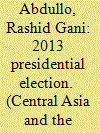

|
|
|
|
|
| Publication |
2014.
|
| Summary/Abstract |
The author looks at the problem of the legitimacy of the 2013 presidential election in Tajikistan as a sine qua non of social and political stability and, consequently, of the country's security and territorial integrity. In Tajikistan's specific case, the election could only be legitimate if the opposition forces, primarily the Islamic Revival Party of Tajikistan (IRP), which comes second after the institution of presidential power as the most influential political force, did not boycott it.
Despite the easily predicted results (another term for President Rakhmon), the IRP leaders decided to take part in the process: an Islamic revival could only take place in a politically stable Tajikistan. To gain public legitimacy for their decision, they organized a series of consultations with representatives of the public to formulate and realize the idea of an Alliance of the Reformist Forces of Tajikistan (ORST), which nominated human rights activist Oinihol Bobonazarova as its joint presidential candidate. She did not run because, after failing to present the necessary number of signatures gathered in her support to the Central Election Commission, she was not registered as a candidate. The IRP leaders abstained from voting, but denied all accusations of boycotting the election.
President Rakhmon, who won the election, and the IRP, which stuck resolutely to its course and was able to keep the Islamic revival going, were both winners. The country benefited the most-the election did not shake the frail stability, while Tajikistan's enemies lost another chance to interfere in its domestic affairs with destructive intentions.
|
|
|
|
|
|
|
|
|
|
|
|
|
|
|
|
| 2 |
ID:
188641
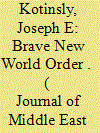

|
|
|
|
|
| Summary/Abstract |
This article uses the history of the Supreme Council for Islamic Revolution in Iraq, the largest Shī‘ī Islamist organization within the exiled Iraqi opposition movement, as a case study to delineate how the meaning, function, and salience of sectarian identities are affected by political and social changes at the local, regional, and international level. To this end, this work identifies and explains a discursive shift observed in SCIRI’s publications produced during its tenure as an Iraqi opposition group. Whereas SCIRI’s publications during the Iran-Iraq War emphasized that its brand of Islamic government would represent all Iraqis regardless of their religious or ethnic affiliation, following the war’s conclusion the Council strove to portray its leaders as the primary defenders of Shī‘ī interests in Iraq and focused near exclusively on the need to protect the rights of Iraq Shī‘ī. It argues that several key developments account for the Supreme Council’s adoption of a Shī‘ī-centric political stance during the 1990s, namely: the internationalization and unification of the Iraqi opposition movement in the aftermath of the 1991 March Uprisings and the post-Cold War environment within which the exiled Iraqi opposition was operating. When considered collectively, beyond demonstrating the contingency and complexity of the advent of Shī‘ī identity politics within Iraqi opposition circles throughout the 1990s, these findings suggest the importance of taking into consideration larger, global trends as contributing factors when conceptualizing how subnational forms of identification acquire heighted social and political salience.
|
|
|
|
|
|
|
|
|
|
|
|
|
|
|
|
| 3 |
ID:
137917
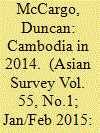

|
|
|
|
|
| Summary/Abstract |
During 2014, Cambodia moved from violent confrontation between government and opposition forces to an uneasy compromise. The turning point came in July, when opposition legislators agreed to take their seats in the National Assembly, which they had boycotted. The long-ruling Cambodian People’s Party worked to polish its tarnished image.
|
|
|
|
|
|
|
|
|
|
|
|
|
|
|
|
| 4 |
ID:
101591
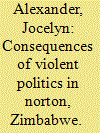

|
|
|
|
|
| Publication |
2010.
|
| Summary/Abstract |
The lasting consequences of violent politics in Zimbabwe cannot be fully grasped without exploring both their institutional and material contexts and local interpretations of the meaning of particular acts of violence. Drawing on narratives of political violence from the town of Norton, three points are made. First, the extreme electoral violence of 2008 was interpreted by opposition members as an almost inexplicable moment of rupture. As a result, it damaged social relations in lasting ways. Second, the powerful link between the ruling party's coercive politics and people's livelihoods in a context of economic collapse meant that violence had deeply damaging effects on every aspect of people's lives from which many have not yet recovered. Third, regardless of their party affiliation, people's political relations with Zimbabwe's Inclusive Government, established in 2009, have been powerfully shaped by their understandings of the material and other obligations constituted through violence and suffering in previous years.
|
|
|
|
|
|
|
|
|
|
|
|
|
|
|
|
| 5 |
ID:
104587
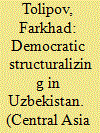

|
|
|
| 6 |
ID:
179109
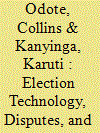

|
|
|
|
|
| Summary/Abstract |
In Africa, many countries have adopted technology in the conduct of elections so as to improve efficiency and deter malpractice. However, electoral disputes and violence continue to recur even where elections involve use of technology. This article builds on a case study of Kenya to show the limitations of technology use in elections. We argue that use of election technology does not guarantee the credibility of elections; technology has become a ‘black box’, which competing parties exploit to either play victim or declare themselves winners. The paper concludes that election technology is the new frontier for fraud. The manner in which election technology is procured, deployed and utilized is not only technical but also political. Addressing this political problem is imperative to avoid political violence around elections.
|
|
|
|
|
|
|
|
|
|
|
|
|
|
|
|
| 7 |
ID:
144086
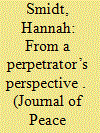

|
|
|
|
|
| Summary/Abstract |
Do international election observers deter or spur violence after election day? This article argues that only when conceptually and empirically distinguishing between violence by governments and opposition groups, can we assess the impact of international election observation. Disaggregating post-electoral violence uncovers that observers can deter governments from using force, but they have the opposite effect on opposition groups. When expecting criticism from observers, opposition leaders can easily deny their responsibility for violence by individual party militants, while weaponry and official insignia betray police and military involvement in violence and force the government to bear command responsibility. Governments also anticipate higher international costs for engaging in post-electoral violence than opposition groups, which are not usually targets of international punishment. On the other hand, international election observers unintentionally incite opposition groups to organize violence, as opposition groups seek to benefit from international attention and support that come with the presence of observers. Observers’ exposure of fraud reverses this differential effect: because governments expect international costs for election rigging anyway, observers cannot deter repression after highly fraudulent elections. But their alertness to electoral malpractice alleviates opposition groups’ incentives for post-electoral violence. Using data on 230 state-wide elections in Africa from 1990 to 2009, the analysis supports the observable implications of this argument. The findings of this article imply that international election observation missions make the post-electoral environment more peaceful when it comes to government repression after non-fraudulent elections. But observers ought to develop greater local expertise to identify opposition grievances before these groups resort to violence and be attentive to the possibility of increased repression after exposing cheating.
|
|
|
|
|
|
|
|
|
|
|
|
|
|
|
|
| 8 |
ID:
152256
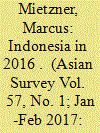

|
|
|
|
|
| Summary/Abstract |
During his second year in power, Indonesian President Joko Widodo faced contradictory yet interrelated trends: while he consolidated his grip over parliament and improved his approval ratings, the president’s remaining opponents shifted the focus of political contestation from the state’s institutions onto the streets. Additionally burdened by economic uncertainty and rising regional tensions over the South China Sea, Indonesian democracy thus continues to be vulnerable, its outward stability notwithstanding.
|
|
|
|
|
|
|
|
|
|
|
|
|
|
|
|
| 9 |
ID:
081857
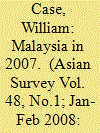

|
|
|
|
|
| Publication |
2008.
|
| Summary/Abstract |
2007 appeared to be a year of political and economic continuity in Malaysia. The government won three by-elections. The economy grew at 5.6%. Tensions over ethnic relations and Islamization simmered, though with probably no greater intensity than in past years. And foreign relations were smoothly conducted. But in an extraordinary scandal, a prominent political advisor went on trial for abetting the murder of his former mistress.
|
|
|
|
|
|
|
|
|
|
|
|
|
|
|
|
| 10 |
ID:
145440
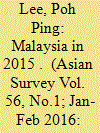

|
|
|
|
|
| Summary/Abstract |
The government of Najib Razak in Malaysia came increasingly under siege in 2015 from within his party, the opposition, and many NGOs. Najib managed to survive, but his hold on power is not solid. Meanwhile, Malaysia’s chairmanship of ASEAN was uneventful, relations with U.S. and China remained good, and GDP growth slowed compared with 2014.
|
|
|
|
|
|
|
|
|
|
|
|
|
|
|
|
| 11 |
ID:
142569
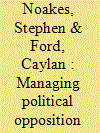

|
|
|
|
|
| Summary/Abstract |
In this article, we seek to explain the persistence of the Communist Party's campaign to suppress the Falun Gong religious movement. We argue that the unrecoverable investment of more than a decade's worth of suppression work, compounded by the ineffectiveness of these efforts (as evinced in official documents and by the continuation of resistance activities), limits the state's ability to halt its campaign against Falun Gong. Our findings shed light on some of the Chinese state's current strategies for the management and control of domestic opposition groups, and challenge the view of the Party as adaptable and highly capable of reform from within.
|
|
|
|
|
|
|
|
|
|
|
|
|
|
|
|
| 12 |
ID:
085535
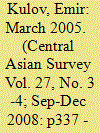

|
|
|
|
|
| Publication |
2008.
|
| Summary/Abstract |
Analyzing political opportunity structure in both the long and short terms, this article focuses specifically on the trigger effect of elections that provided the political space for oppositional leaders to frame their grievances. The emerging framework of understanding mobilization in the coloured revolutions combines stolen elections as a motivating trigger; an incumbent weakened by succession crisis and disunity of his power base; the semi-authoritarian character of pre-revolutionary politics; an opposition able to unite despite their inevitable differences and potentially important international factors. The specific mechanisms that translated stolen elections into mass demonstrations, succession crisis into a defeat of the incumbent and foreign example into a spillover effect, are not yet perfectly understood, and nor are their outcomes. The implications of how stolen and manipulated elections differ from each other are explored.
|
|
|
|
|
|
|
|
|
|
|
|
|
|
|
|
| 13 |
ID:
144755
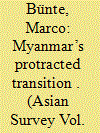

|
|
|
|
|
| Summary/Abstract |
This article argues that Myanmar is experiencing the beginning of a protracted transition, in which the military, the opposition, and the country’s civil society are renegotiating political space. The protracted transition might take decades, and opposition forces and civil society will face an uphill struggle to fully liberalize the regime.
|
|
|
|
|
|
|
|
|
|
|
|
|
|
|
|
| 14 |
ID:
176135
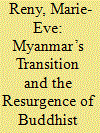

|
|
|
|
|
| Summary/Abstract |
Myanmar began a transition in 2011 that ended almost 50 years of military rule. During the transition, a nationalist movement called for protecting Buddhism from an “Islamic threat.” Anti-Islam nationalism was not new in Burmese history, yet the timing of its resurgence deserves attention. I argue that the incumbents’ anticipated electoral weakness in transitional elections was the primary reason for its resurgence. The incumbents sought to maximize societal support, and they faced a strong contender, the National League for Democracy, whose probability of winning was high. Social opposition was also significant by the time military rule ended. In a campaign to pass reforms to better “protect” Buddhism, the incumbents used monks to cast doubt on the NLD’s ability to represent Buddhist interests and to recruit former regime opponents who were nationalists. The incumbents garnered wide support for the reforms, yet it was insufficient for an electoral victory.
|
|
|
|
|
|
|
|
|
|
|
|
|
|
|
|
| 15 |
ID:
179561
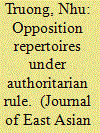

|
|
|
|
|
| Summary/Abstract |
Civil society actors collectively organized online and offline to nominate themselves and oppose the Vietnamese Communist Party in the 2016 legislative election. The level of opposition coordination among these independent self-nominees exceeded and qualitatively differed from previous atomized attempts in the 2011 election. External shifts in the political opportunity structure offer only a partial explanation for the increased coordination among independent candidates in Vietnam's 2016 self-nomination movement. In this article, I theorize that it is the combination of both opportunity structure and overlapping linkages across spheres of social contention and civil society, all accumulated from a prior history of protests and activism, that provide the conditions for the emergence of independent self-nominees and opposition coordination in single-party-elections. In Vietnam, a cumulative process of participation in social contention and civil society organizations during 2011 to 2016 allowed actors to develop linkages that strengthened their repertoires of contention and resonant frames of collective action. These linkages, combined with favorable political opportunities, effectively facilitated greater mobilization and coordination among independent self-nominees in the 2016 election.
|
|
|
|
|
|
|
|
|
|
|
|
|
|
|
|
| 16 |
ID:
179259
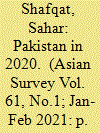

|
|
|
|
|
| Summary/Abstract |
Pakistan began the year with the military establishment having tightened its grip on political institutions, but as the year progressed, opposition parties sought to reassert themselves and challenged both the PTI government and military leaders. Political movements took center stage as religious extremists as well as regionalist movements drew strength from the challenges to the PTI government. Feminists demanded action after a series of sexual assaults, and religious minorities continued to be targeted by violence. The COVID pandemic upended the economy, which was already straining under low growth and high debt and deficit conditions. Foreign relations provided many challenges as the government sought to target India for its mistreatment of Kashmiris, while the Pakistan–China relationship remained strong.
|
|
|
|
|
|
|
|
|
|
|
|
|
|
|
|
| 17 |
ID:
174536
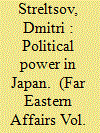

|
|
|
|
|
| Summary/Abstract |
The results from the elections of 2017 and 2019 show that the coalition of the Liberal Democratic Party and the Komeito once again has a stable majority in both houses of parliament. This article analyzes the reasons for the electoral failures of the opposition. These include such factors as the predominance of a large conservative segment in the electoral field, a rise of populism in society, a demand for charismatic leaders, and Shinzo Abe's skillful use of the possibilities offered by the media. Future prospects for the opposition are seen in the promotion of political alternatives with regard to social policy that are attractive in the eyes of the electorate.
|
|
|
|
|
|
|
|
|
|
|
|
|
|
|
|
| 18 |
ID:
173131
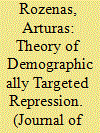

|
|
|
|
|
| Summary/Abstract |
People from specific ethnic, religious, or other externally identifiable groups are often subjected to harsher repression than others. This phenomenon of demographically targeted repression is often viewed as a result of xenophobia. I provide a rationalist explanation of demographic targeting to understand why this form of repression is employed even without xenophobic motives. Building on the empirical literature, I model an environment where a threat of repression may motivate people to oppose the regime defensively. I show that, in such conditions, the regime may use demographic targeting to undermine cross-group collective action. The model explains when demographic targeting is used and how it shapes the behavior and identity of citizens. I use the model to make sense of certain aspects of repression policy in China
|
|
|
|
|
|
|
|
|
|
|
|
|
|
|
|
| 19 |
ID:
090976
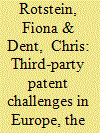

|
|
|
|
|
| Publication |
2009.
|
| Summary/Abstract |
Third parties are now playing a key role in the processes leading to the grant, and validation, of patents. This article looks at the key differences between three systems of third-party challenge, which have the common goal of providing patentees and their competitors with a forum, other than the courts, where issues of patent validity may be challenged and resolved. Those systems are post-grant opposition before the European Patent Office, pre-grant opposition in Australia and re-examination in the United States. Various aspects of the systems are looked at, including an overview of the procedures, avenues of appeal and statistics on their use. Insufficient empirical evidence is available to permit a comprehensive assessment of which system is the most effective; however, the data available do allow some conclusions to be drawn-including the suggestion that one reason for the differences in levels of use of the three systems may be the perceptions of US Patent and Trademark Office examiners and the culture that has built up within the US patent attorney profession. The degree of divergence in the three systems further indicates that more work needs to be carried out if reforms to the procedures are to be based on need rather than supposition.
|
|
|
|
|
|
|
|
|
|
|
|
|
|
|
|
| 20 |
ID:
148345
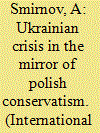

|
|
|
|
|
| Summary/Abstract |
MANY EUROPEAN STATES recognized the Ukrainian crisis as a serious reason to revise their political opinions and change the balance of power. For historical reasons and due to the sharpening struggle between the main political forces inside the state, Poland is involved in the process to a much greater extent than its East European neighbors. To the last moment, the right-wing conservatives remained in determined opposition to the policies of the liberal forces that for a long time controlled the Polish political Olympus practically unhampered. The victory of the conservative Law and Justice Party (PiS) at the 2015 presidential elections added urgency to the problem of the Polish-Ukrainian political interaction.
|
|
|
|
|
|
|
|
|
|
|
|
|
|
|
|
|
|
|
|
|